McConnell Campbell R., Brue Stanley L., Barbiero Thomas P. Microeconomics. Ninth Edition
Подождите немного. Документ загружается.

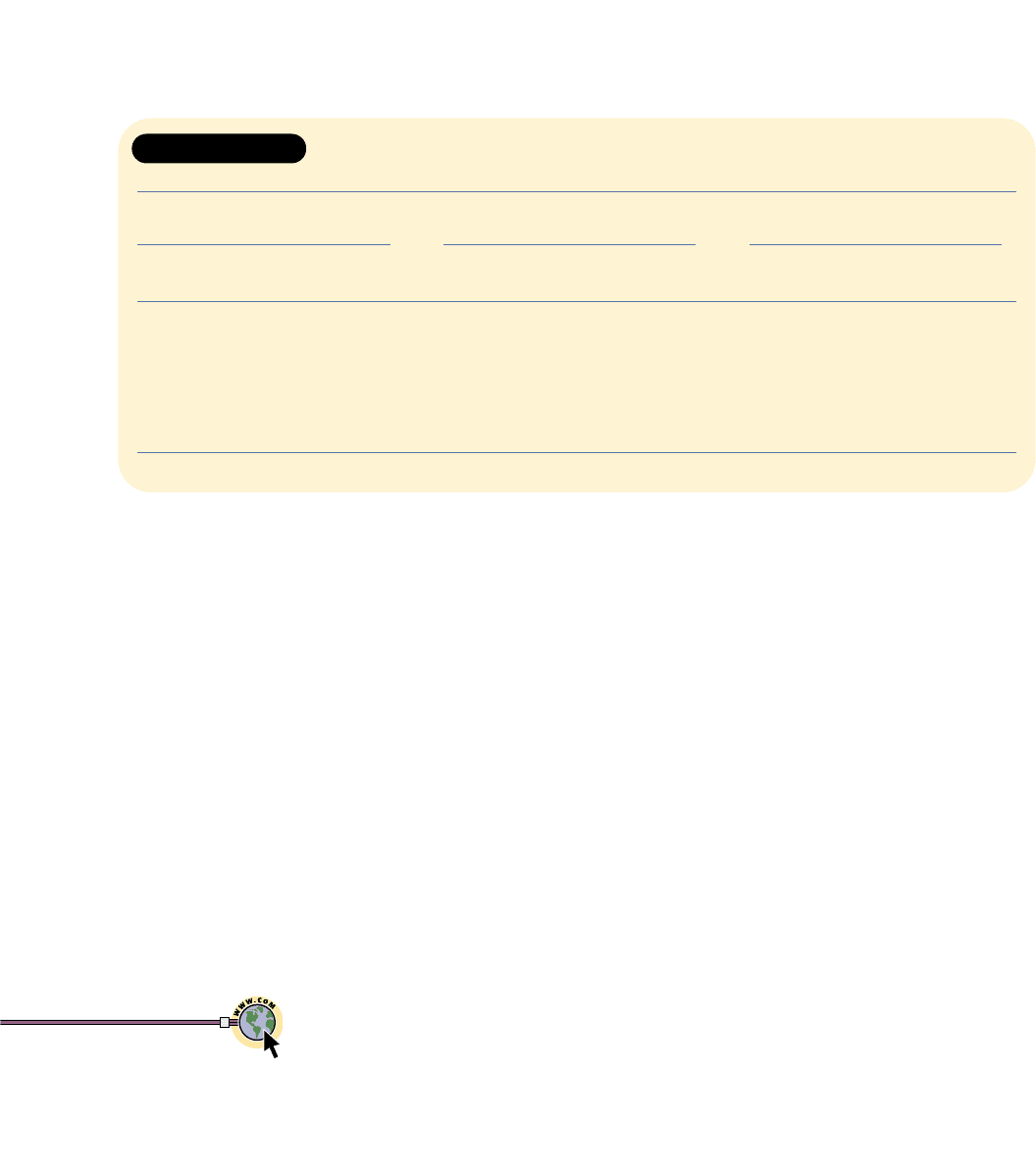
income of $16,000, transfer payments are zero. The level of earned income at which
the transfer payments disappear is called the break-even income.
We might criticize plan 1 on the grounds that a 50 percent benefit-reduction rate
is too high and therefore does not provide sufficient incentives to work. As earned
income increases, the loss of transfer payments constitutes a tax on earnings. Some
people may choose not to work when they lose 50 cents of each extra dollar earned.
Thus in plan 2 the $8,000 minimum income is retained, but the benefit-reduction
rate is reduced to 25 percent. But note that the break-even level of income increases
to $32,000, so many more families would now qualify for transfer payments. Fur-
thermore, a family with any earned income under $32,000 will receive a larger total
transfer payment. For both reasons, a reduction of the benefit–loss rate to enhance
work incentives will raise the cost of the income-maintenance plan.
After examining plans 1 and 2, we might argue that the $8,000 minimum annual
income is too low—it does not get families out of poverty. Plan 3 raises the mini-
mum income to $12,000 and retains the 50 percent benefit-reduction rate of plan 1.
While plan 3 does a better job of raising the incomes of the poor, it too yields a
higher break-even income than plan 1 and therefore will be more costly. Also, if the
$12,000 income guarantee of plan 3 were coupled with plan 2’s 25 percent benefit-
reduction rate to strengthen work incentives, the break-even income level would
shoot up to $48,000 and add even more to the costs of the public assistance program.
Conflicts among Goals
Clearly, the goals of eliminating poverty, maintaining work incentives, and holding
down program costs are in conflict.
Plan 1, with a low minimum income and a high benefit-reduction rate, keeps cost
down. But the low minimum income means that this plan is not very effective in
eliminating poverty, and the high benefit-reduction rate weakens work incentives.
In comparison, plan 2 has a lower benefit-reduction rate and therefore stronger
work incentives. But it is more costly because it sets a higher break-even income and
therefore pays benefits to more families.
Compared with plan 1, plan 3 has a higher minimum income and is more effec-
tive in eliminating poverty. While work incentives are the same as those in plan 1, the
higher guaranteed income in plan 3 makes the plan more costly. (Key Question 9)
chapter seventeen • income inequality and poverty 451
<www.un.org/esa/
socdev/poverty.htm>
UN declares 1997–2006
the Decade for the
Eradication of Poverty
TABLE 17-5 TRADEOFFS AMONG GOALS: THREE PUBLIC
ASSISTANCE PLANS
Plan 1 ($8,000 minimum income Plan 2 ($8,000 minimum income Plan 3 ($12,000 minimum income
and 50% benefit-reduction rate) and 25% benefit-reduction rate) and 50% benefit-reduction rate)
Earned Transfer Total Earned Transfer Total Earned Transfer Total
income payment income income payment income income payment income
$ 0 $8,000 $ 8,000 $ 0 $8,000 $ 8,000 $ 0 $12,000 $12,000
4,000 6,000 10,000 8,000 6,000 14,000 8,000 8,000 16,000
8,000 4,000 12,000 16,000 4,000 20,000 16,000 4,000 20,000
12,000 2,000 14,000 24,000 2,000 26,000 24,000* 12,000 24,000
16,000* 0 16,000 32,000* 0 32,000
*Indicates break-even income. Determined by dividing the minimum income by the benefit-reduction rate.
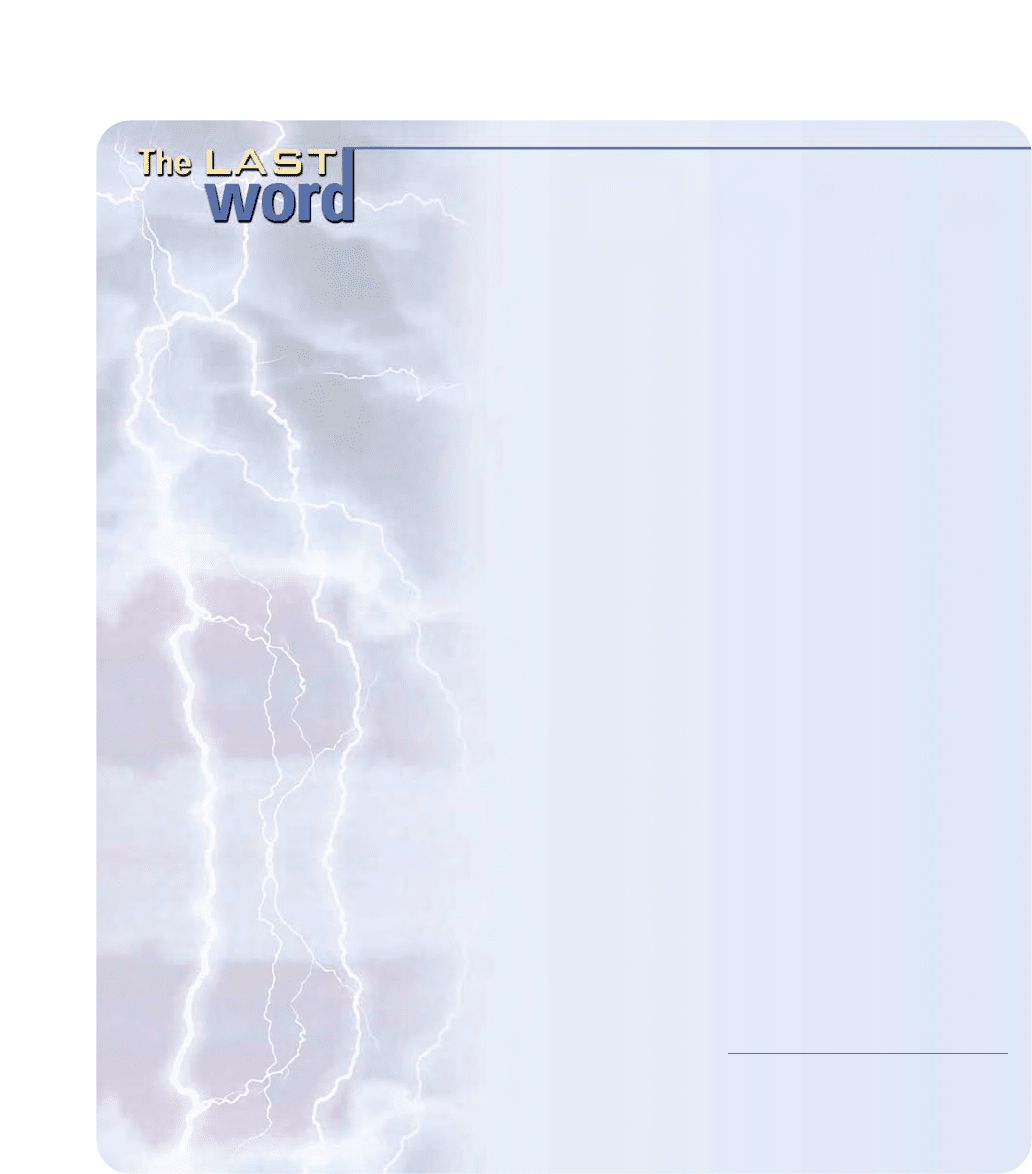
452 Part Three • Microeconomics of Resource Markets
Poor people in 60 countries were
asked to analyze and share their
ideas of well-being (a good ex-
perience of life) and “ill-being”
(a bad experience of life).
Well-being was variously de-
scribed as happiness, harmony,
peace, freedom from anxiety,
and peace of mind. In Russia
people say, “Well-being is a life
free from daily worries about
lack of money.” In Bangladesh,
“to have a life free from anxi-
ety.” In Brazil, “not having to go
through so many rough spots.”
People describe ill-being as
lack of material things, as bad
experiences, and as bad feel-
ings about oneself. A group of
young men in Jamaica ranks
lack of self-confidence as the
second biggest impact of
poverty: “Poverty means we
don’t believe in [ourselves], we
hardly travel out of the commu-
nity—so frustrated, just locked
up in a house all day.”
Universal Problems
Although the nature of ill-being
and poverty varies among loca-
tions and people—something
that policy responses must take
into account—there is a striking
commonality across countries.
Not surprising, material well-
being turns out to be very im-
portant. Lack of food, shelter,
and clothing is mentioned every-
where as critical. In Kenya a man
says: “Don’t ask me what
poverty is because you have met
it outside my house. Look at the
house and count the number of
holes. Look at my utensils and
the clothes I am wearing. Look at
everything and write what you
see. What you see is poverty.”
Alongside the material, phys-
ical well-being features promi-
nently in the characterizations of
poverty. And the two meld to-
gether when lack of food leads
to ill health—or when ill health
leads to an inability to earn in-
come. People speak about the
importance of looking well fed.
In Ethiopia poor people say, “We
are skinny,” “We are deprived
and pale,” and speak of life that
“makes you older than your
age.”
More Than Material Goods
Security of income is also
closely tied to health. But inse-
curity extends beyond ill health.
Crime and violence are often
mentioned by poor people. In
Ethiopia women say, “We live
hour to hour,” worrying about
whether it will rain. An Argen-
tine says, “You have work, and
you are fine. If not, you starve.
That’s how it is.” Two social as-
pects of ill-being and poverty
also emerged. For many poor
people, well-being means the
freedom of choice and action
and the power to control one’s
life. A young woman in Jamaica
says that poverty is “like living in
jail, living in bondage, waiting to
be free.”
Linked to these feelings are
definitions of well-being as so-
cial well-being and comments
on the stigma of poverty. As an
old woman in Bulgaria says, “to
be well means to see your
grandchildren happy and well
dressed and to know that your
children have settled down; to
be able to give them food and
money whenever they come to
see you, and not to ask them
for help and money.” A Somali
proverb captures the other side:
“Prolonged sickness and per-
sistent poverty cause people to
hate you.”
Source: World Development Report
2000–2001, “Introduction,”(Oxford
University Press, New York, 2000),
<www.worldbank.org/poverty/wdr
poverty/report/ch1.pdf>.
POVERTY IN THE VOICES OF
POOR PEOPLE
While statistics tell us much about poverty and inequality,
the statements below attest to the human suffering
caused by insufficient material means in many nations.

chapter summary
chapter seventeen • income inequality and poverty 453
1. The distribution of income in Canada reflects
considerable inequality. After taxes, the top
20 percent of families earn 41.4 percent of
total income, while the bottom 20 percent
earn only 5.5 percent.
2. The Lorenz curve shows the percentage of
total income received by each percentage of
families. The extent of the gap between the
Lorenz curve and a line of total equality illus-
trates the degree of income inequality.
3. Recognizing that the positions of individual
families in the distribution of income change
over time and incorporating the effects of
noncash transfers and taxes would reveal less
income inequality than do standard census
data. Government transfers (cash and non-
cash) greatly lessen the degree of income
inequality; taxes also reduce inequality but
not nearly as much as transfers.
4. Absolute poverty occurs when the basic
material needs are not met. Relative poverty
refers to an individual’s or a family’s low
income relative to the rest of society. Absolute
poverty can be eradicated, but relative
poverty is much more difficult to resolve.
5. Causes of income inequality include differ-
ences in abilities, education and training, and
job tastes, along with discrimination, inequal-
ity in the distribution of wealth, and an un-
equal distribution of market power.
6. The basic argument for income equality is
that it maximizes consumer satisfaction (total
utility) from a particular level of total income.
The main argument for income inequality is
that it provides the incentives to work, invest,
and assume risk; it is necessary for the pro-
duction of output that, in turn, creates income
that is then available for distribution.
7. Current statistics suggest that about 17.5 per-
cent of the country lives in poverty. Poverty is
concentrated among the poorly educated, the
aged, and families headed by women.
8. Our present income maintenance system is
made up of social insurance programs
(Canada Pension Plan and employment insur-
ance benefits), universal programs (Old Age
Security Pension), and public assistance or
welfare programs.
9. Public assistance programs (welfare) are
difficult to design because their goals of
reducing property, maintaining work incen-
tives, and holding down program costs often
conflict.
terms and concepts
income inequality, p. 438
Lorenz curve, p. 438
income mobility, p. 440
noncash transfers, p. 440
tradeoff between equality and
efficiency, p. 446
absolute poverty, p. 447
relative poverty, p. 447
Canada Pension Plan (CPP),
p. 449
Old Age Security (OAS),
p. 449
Guaranteed Income
Supplement (GIS), p. 450
employment insurance, p. 450
study questions
1. Using quintiles, briefly summarize the degree
of income inequality in Canada.
2.
KEY QESTION Assume Syed, Beth,
Sabine, David, and Mikkel receive incomes
of $500, $250, $125, $75, and $50 respec-
tively. Construct and interpret a Lorenz curve
for this five-person economy. What percent-
age of total income is received by the richest
quintile and by the poorest quintile?
3. Why is the lifetime distribution of income
more equal than the distribution in any spe-
cific year?
4.
KEY QUESTION Briefly discuss the
major causes of income inequality. With
respect to income inequality, is there any dif-
ference between inheriting property and
inheriting a high IQ? Explain.
5. Use the leaky-bucket analogy to discuss the
equality–efficiency tradeoff.
6. Should a nation’s income be distributed to
its members according to their contributions
to the production of that total income or
according to the members’ needs? Should
society attempt to equalize income or
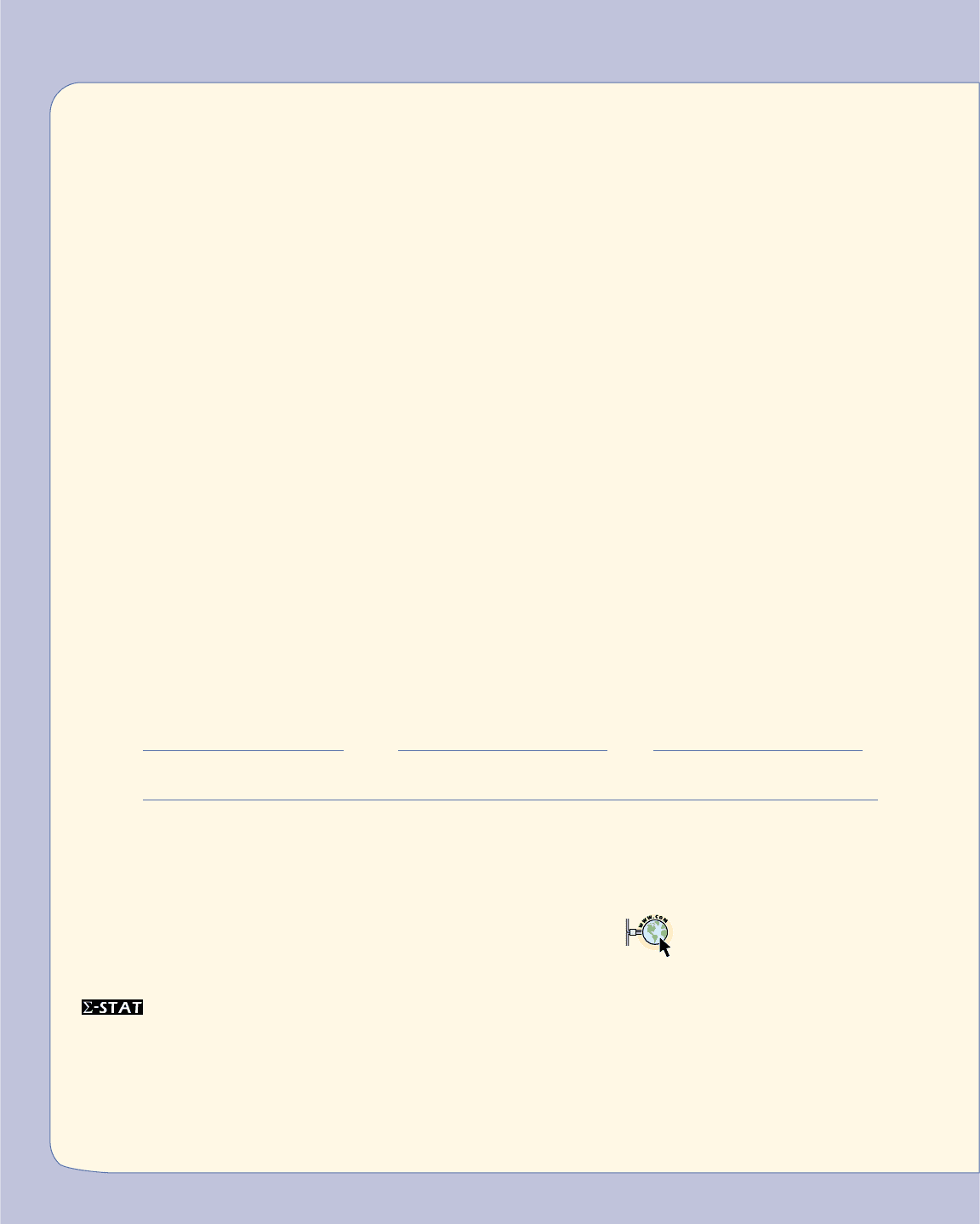
454 Part Three • Microeconomics of Resource Markets
economic opportunities? Are the issues of
equity and equality in the distribution of in-
come synonymous? To what degree, if any,
is income inequality equitable?
7. Analyze in detail: “There need be no tradeoff
between equality and efficiency. An efficient
economy that yields an income distribution
many regard as unfair may cause those with
meagre income rewards to become discour-
aged and stop trying. Hence, efficiency is un-
dermined. A fairer distribution of rewards
may generate a higher average productive
effort on the part of the population, thereby
enhancing efficiency. If people think they are
playing a fair economic game and this belief
causes them to try harder, an economy with
an equitable income distribution may be effi-
cient as well.
”
8. Comment on or explain:
a. “To endow everyone with equal income
will certainly make for very unequal
enjoyment and satisfaction.”
b. “Equality is a superior good: the richer we
become, the more of it we can afford.”
c. “The mob goes in search of bread, and
the means it employs is generally to wreck
the bakeries.”
d. “Some freedoms may be more important
in the long run than freedom from want
on the part of every individual.”
e. “Capitalism and democracy are really a
most improbable mixture. Maybe that
is why they need each other—to put
some rationality into equality and some
humanity into efficiency.”
f. “The incentives created by the attempt to
bring about a more equal distribution of
income are in conflict with the incentives
needed to generate increased income.”
9.
KEY QUESTION The following table
contains three hypothetical public assistance
plans.
a. Determine the minimum income, the
benefit-reduction rate, and the break-even
income for each plan.
b. Which plan is the most costly? the least
costly? Which plan is the most effective
in reducing poverty? the least effective?
Which plan embodies the strongest dis-
incentive to work? the weakest disincen-
tive to work?
c. Use your answers in part b to explain the
following statement: “The dilemma of
public assistance is that you cannot bring
families up to the poverty level and
simultaneously preserve work incentives
and minimize program costs.”
10. (The Last Word) How do poor people
describe “well being” and “ill-being”?
internet application questions
1. Statistics Canada at <www.statcan.ca/english/
Pgdb/People/Famili.htm#inc> compiles infor-
mation about low income in Canada. Use
that site to answer the following questions:
a. Is the percentage of the population living
below Statistics Canada’s low income cut-
off higher or lower than in the previous
year reported? Compared to a decade
earlier?
b. Is the poverty rate (in percent) higher or
lower than the previous year for the gen-
eral population and children under 18
and the elderly?
Plan One Plan Two Plan Three
Earned Transfer Total Earned Transfer Total Earned Transfer Total
income payment income income payment income income payment income
$ 0 $4,000 $4,000 $ 0 $4,000 $ 4,000 $ 0 $8,000 $ 8,000
2,000 3,000 5,000 4,000 3,000 7,000 4,000 6,000 10,000
4,000 2,000 6,000 8,000 2,000 10,000 8,000 4,000 12,000
6,000 1,000 7,000 12,000 1,000 13,000 12,000 2,000 14,000
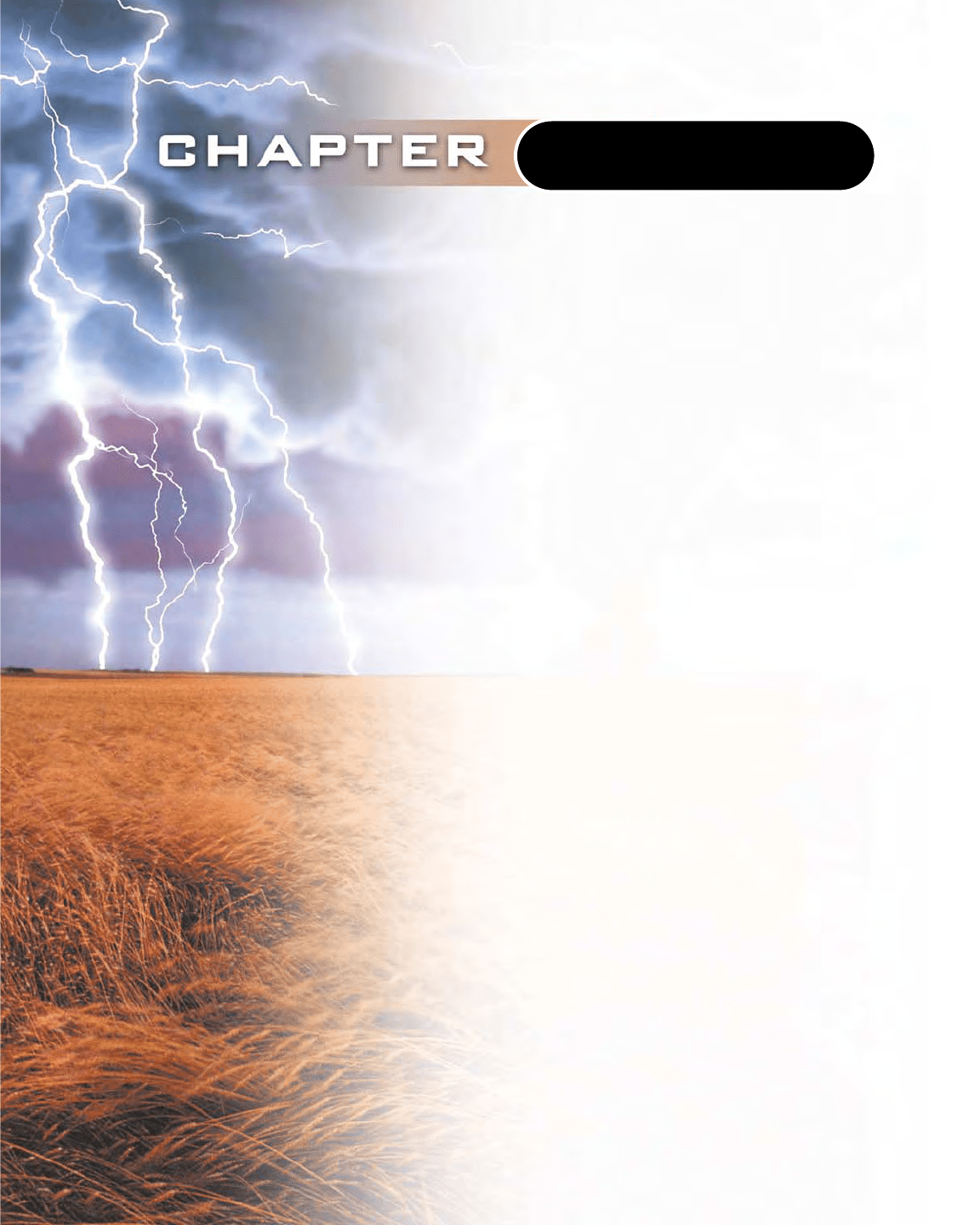
IN THIS CHAPTER
IN THIS CHAPTER
Y
Y
OU WILL LEARN:
OU WILL LEARN:
To distinguish between a
public and private good.
•
How to determine the optimal
amount of a public good.
•
The nature of externalities and
the ways of dealing with them.
•
About information failures.
Government
and Market
Failure
T
he economic activities of government
affect your well-being every day. If you
drive to work or to school, you are using
publicly provided highways and streets. If
you attend a college or university, taxpayers
subsidize your education. When you receive
a cheque from your job, you see deductions
for income taxes and social insurance taxes.
Government antipollution laws affect the air
you breathe. Laws requiring seat belts and
motorcycle helmets and the sprinkler system
in university dormitories are all government
mandates.
EIGHTEEN

In this chapter we examine market failure—a circumstance in which private markets
do not bring about the allocation of resources that best satisfies society’s wants.
Where private markets fail, an economic role for government may arise. In this
chapter we examine how government responds to three types of market failure:
public goods, externalities, and information asymmetries. Our discussion of exter-
nalities in turn opens the way for a discussion of pollution and pollution policies.
In Chapter 19 our discussion of the microeconomics of government continues
with an analysis of potential government inefficiencies—called government failure—
and the economics of taxation.
Recall from Chapter 4 that a private good is divisible because it comes in units small
enough for individual buyers to afford. It is also subject to the exclusion principle: peo-
ple unwilling or unable to pay for the product are barred from obtaining its benefits.
Because of these characteristics, the demand for a private good gets expressed in the
marketplace, and profit-seeking suppliers satisfy that demand. In contrast, a public
good is indivisible and does not fit the exclusion principle. Once a producer has pro-
vided a public good, it cannot bar those who don’t pay from obtaining the benefits.
Consequently, the demand for the good is understated in the marketplace, and firms
thus lack a profit incentive to offer it for sale. If the good is to exist at all, government
will have to provide it. Two simple examples will help clarify these ideas.
The market demand for a private good is the horizontal summation of the
demand curves representing all individual buyers (review Table 3-2 and Figure 3-
2). Suppose just two people in society enjoy hot dogs, which cost $.80 each to pro-
duce. If Adams wants to buy three hot dogs at $1 each and Benson wants to buy two
hot dogs at that same price, the market demand curve will reflect that five hot dogs
are demanded at a $1 price. A seller charging $1 for each hot dog can gain $5 of rev-
enue and earn $1 of profit ($5 of total revenue minus $4 of cost).
The situation is different with public goods. Suppose an enterprising sculptor
creates a piece of art costing $600 and places it in the town square. Also suppose that
Adams gets $300 of enjoyment from the art and Benson gets $400. Sensing this
enjoyment and hoping to make a profit, the sculptor approaches Adams for a dona-
tion equal to his satisfaction. Adams falsely says that, unfortunately, he doesn’t
much like the piece. The sculptor then tries Benson, hoping to get $400 or so. Same
deal: Benson professes not to like the piece either. Adams and Benson have become
free riders. Although feeling a bit guilty, both reason that it makes no sense to pay for
something when you can receive the benefits without paying for them. The artist is
a quick learner; he vows never to try anything like that again.
Generalization: Because of the free-rider problem, the market demand for a pub-
lic good is nonexistent or significantly understated. Where a producer cannot
exclude those who do not pay from receiving the benefits from a good, it is difficult,
if not impossible, for the producer to profitably offer the good for sale. Government
will have to provide it.
Demand for Public Goods
If consumers need not reveal their true demand for a public good in the marketplace,
then how can the optimal amount of that good be determined? The answer is that the
government has to try to estimate the demand for a public good through surveys or
public votes. Suppose Adams and Benson are the only two people in the society, and
their marginal willingness to pay for a public good, this time national defence, is as
chapter eighteen • government and market failure 457
Public Goods
<members.aol.com/
trajcom/private/
commons.htm>
The commons
The Role of
Governments
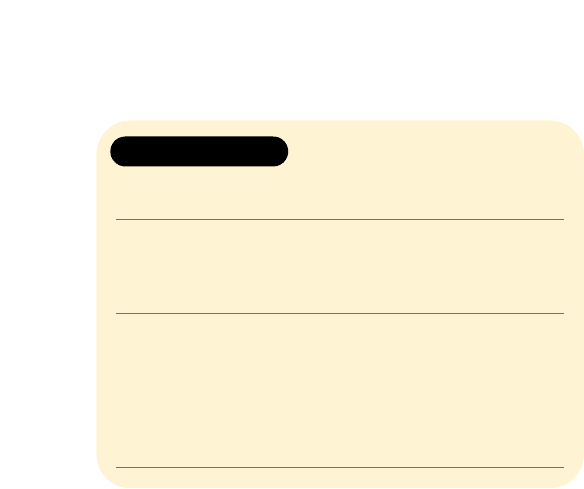
shown in columns 1, 2, and 3 in Table 18-1. Econ-
omists might have discovered these schedules
through a survey asking hypothetical questions
about how much each citizen was willing to pay
for various types and amounts of public goods
rather than go without them.
Notice that the schedules in Table 18-1 are
price–quantity schedules, implying that they
are demand schedules. Rather than depicting
demand in the usual way—the quantity of a
product someone is willing to buy at each pos-
sible price—these schedules show the price
someone is willing to pay for the marginal unit
of each possible quantity. That is, Adams is will-
ing to pay $4 for the first unit of the public good,
$3 for the second, $2 for the third, and so on.
Suppose the government produces one unit of this public good. Because the
exclusion principle does not apply, Adams’s consumption of the good does not pre-
clude Benson from also consuming it, and vice versa. So both consume the good, and
neither volunteers to pay for it. But from Table 18-1 we can find the amount these two
people would be willing to pay, together, rather than do without this one unit of the
good. Columns 1 and 2 show that Adams would be willing to pay $4 for the first unit
of the public good; columns 1 and 3 show that Benson would be willing to pay $5 for
it. So the two people are jointly willing to pay $9 (= $4 + $5) for this unit.
For the second unit of the public good, the collective price they are willing to pay
is $7 (= $3 from Adams plus $4 from Benson); for the third unit they will pay $5
(= $2 plus $3); and so on. By finding the collective willingness to pay for each addi-
tional unit (column 4), we can construct a collective demand schedule (a willing-
ness-to-pay schedule) for the public good. Here, we are not adding the quantities
demanded at each possible price as when we determine the market demand for a
private good. Instead, we are adding the prices that people are willing to pay for the last
unit of the public good at each possible quantity demanded.
Figure 18-1 shows the same adding procedure graphically, using the data from Table
18-1. Note that we sum Adams’s and Benson’s willingness-to-pay curves vertically to
derive the collective willingness-to-pay curve (demand curve). For example, the height
of the collective demand curve D
c
at two units of output, is $7, the sum of the amounts
that Adams and Benson are each willing to pay for the second unit (= $3 + $4). Likewise,
the height of the collective demand curve at four units of the public good is $3 (= $1 + $2).
What does it mean in Figure 18-1(a) that, for example, Adams is willing to pay $3
for the second unit of the public good? It means that Adams expects to receive $3 of
extra benefit or utility from that unit. And we know from the law of diminishing
marginal utility that successive units of any good yield less and less added benefit.
This is also true for public goods, explaining the downward slope of the willing-
ness-to-pay curves of both Adams and Benson, and of the collective demand curve.
These curves, in essence, are marginal-benefit curves. (Key Question 1)
Supply of Public Goods
The supply curve for any good, private or public, is its marginal-cost curve. Mar-
ginal cost rises as more of a good is produced. The reason is the law of diminishing
returns, which applies whether a society is making missiles (a public good) or
mufflers (a private good). In the short run, government has fixed resources (public
capital) with which to produce public goods such as national defence. As it adds
458 Part Four • Microeconomics of Government and Public Policy
TABLE 18-1 DEMAND FOR A
PUBLIC GOOD,
TWO INDIVIDUALS
(1) (2) (3) (4)
Quantity Adams’s Benson’s Collective
of public willingness willingness willingness
good to pay (price) to pay (price) to pay (price)
1$4+$5=$9
2 3 +4 =7
3 2 +3 =5
4 1 +2 =3
5 0 +1 =1
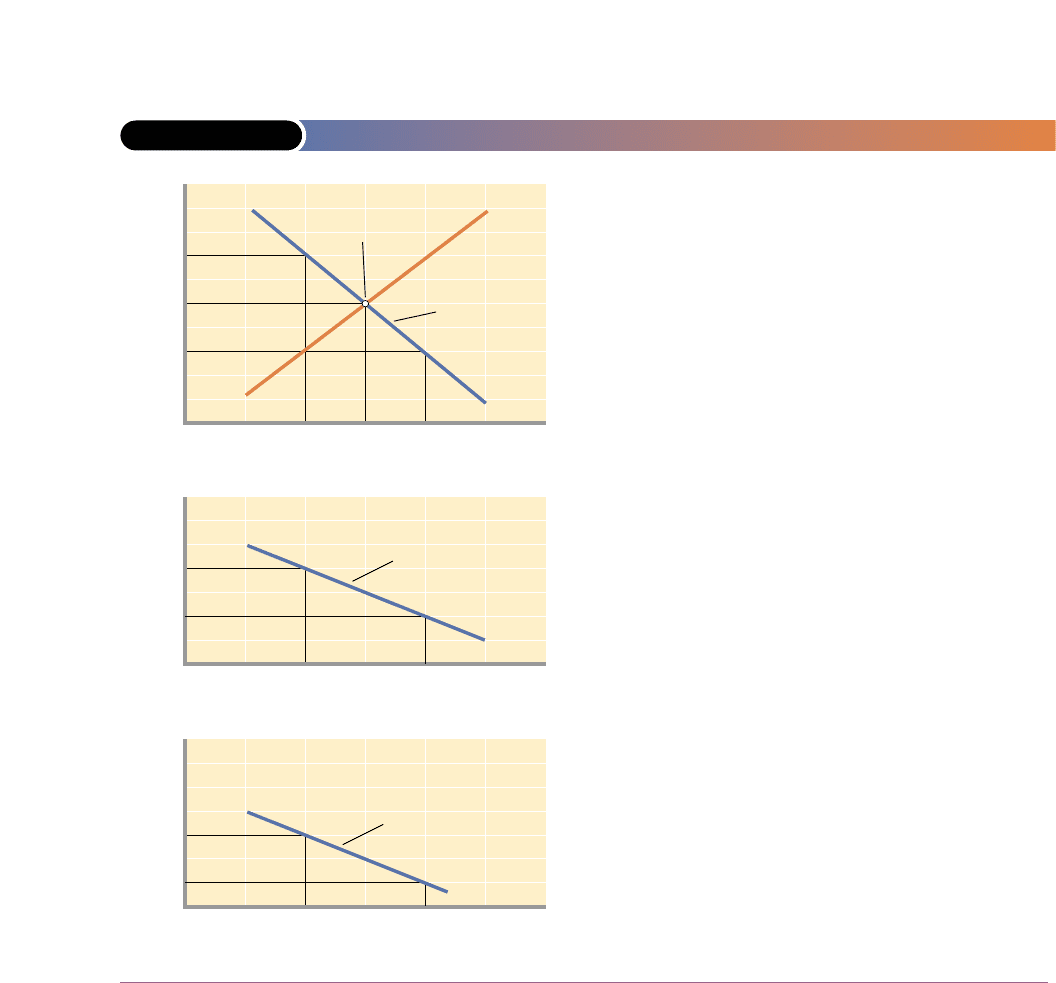
more units of a variable resource (labour) to these fixed resources, total product
eventually rises at a diminishing rate. That means that marginal product falls and
marginal cost rises, explaining why curve S in Figure 18-1(c) slopes upward.
Optimal Quantity of a Public Good
We can now determine the optimal quantity of the public good. The collective
demand curve D
c
in Figure 18-1(c) measures society’s marginal benefit of each unit
of this particular good. The supply curve S in that figure measures society’s mar-
ginal cost of each unit. The optimal quantity of this public good occurs where mar-
ginal benefit equals marginal cost, or where the two curves intersect. In Figure
18-1(c) that point is three units of the public good, where the collective willingness
to pay for the last (third) unit—the marginal benefit—just matches that unit’s mar-
ginal cost ($5 = $5). As we saw in Chapter 2, equating marginal benefit and marginal
cost efficiently allocates society’s scarce resources. (Key Question 2)
chapter eighteen • government and market failure 459
FIGURE 18-1 THE OPTIMAL AMOUNT OF A PUBLIC GOOD
$9
7
5
3
1
1234
05
P
Q
Optimal quantity
Collective
willingness
to pay
(c) Collective demand and supply
$6
5
4
3
2
1
1234
05
P
Q
Benson's
willingness
to pay
(b) Benson
$6
5
4
3
2
1
1234
05
P
Q
S
D
c
D
2
D
1
Adams's
willingness
to pay
(a) Adams
The collective demand curve for a public good, as shown by
D
c
in panel (c), is found by summing vertically the individual
willingness-to-pay curves D
1
in panel (a) and D
2
in panel (b)
of Adams and Benson, the only two people in the economy.
The supply curve of the public good represented in panel (c)
slopes upward and to the right, reflecting rising marginal
costs. The optimal amount of the public good is three units,
determined by the intersection of D
c
and S. At that output,
marginal benefit (reflected in the collective demand curve
D
c
) equals marginal cost (reflected in the supply curve S).

Cost–Benefit Analysis
The above example suggests a practical means, called cost–benefit analysis, for
deciding whether to provide a particular public good and how much of it to
provide. Like our example, cost–benefit analysis (or marginal benefit–marginal cost
analysis) involves a comparison of marginal costs and marginal benefits.
CONCEPT
Suppose the federal government is contemplating a highway construction plan.
Because the economy’s resources are limited, any decision to use more resources in
the public sector will mean fewer resources for the private sector. There will be both
a cost and a benefit. The cost is the loss of satisfaction resulting from the accompa-
nying decline in the production of private goods; the benefit is the extra satisfaction
resulting from the output of more public goods. Should the needed resources be
shifted from the private to the public sector? The answer is yes if the benefit from
the extra public goods exceeds the cost that results from having fewer private
goods. The answer is no if the cost of the forgone private goods is greater than the
benefit associated with the extra public goods.
Cost–benefit analysis, however, can indicate more than whether a public program
is worth doing. It can also help the government decide on the extent to which a proj-
ect should be pursued. Real economic questions cannot usually be answered sim-
ply by yes or no but, rather, are matters of how much or how little.
ILLUSTRATION
Although a few private toll roads exist, highways clearly have public good charac-
teristics because the benefits are widely diffused and the exclusion principle is not
easily applied. Should the federal government expand the federal highway system?
If so, what is the proper size or scope for the overall project?
Table 18-2 lists a series of increasingly ambitious and increasingly costly highway
projects: widening existing two-lane highways; building new two-lane highways;
building new four-lane highways; building new six-lane highways. The extent to
which government should undertake highway construction depends on the costs
and benefits. The costs are largely the costs of constructing and maintaining the high-
ways; the benefit is an improved flow of people and goods throughout the nation.
The table shows that total benefit (column 4) exceeds total cost (column 2) for
plans A, B, and C, indicating that some highway construction is economically justi-
fiable. We see this directly in column 6, where total costs (column 2) are subtracted
460 Part Four • Microeconomics of Government and Public Policy
TABLE 18-2 COST–BENEFIT ANALYSIS FOR A NATIONAL HIGHWAY
CONSTRUCTION PROJECT, BILLIONS OF DOLLARS
(1) (2) (3) (4) (5) (6)
Plan Total cost Marginal Total Marginal Net benefit
of project cost benefit benefit or (4) – (2)
No new construction $ 0 $ 0 $0
A: Widen existing highways 4
$4
5
$5
1
B: Two-lane highways 10
6
13
8
3
C: Four-lane highways 18
8
23
10
5
D: Six-lane highways 28
10
26
3
–2
cost–
benefit
analysis
Comparing the
marginal costs of a
government project
or program with the
marginal benefits to
decide whether to
employ resources
in that project or
program and to
what extent.
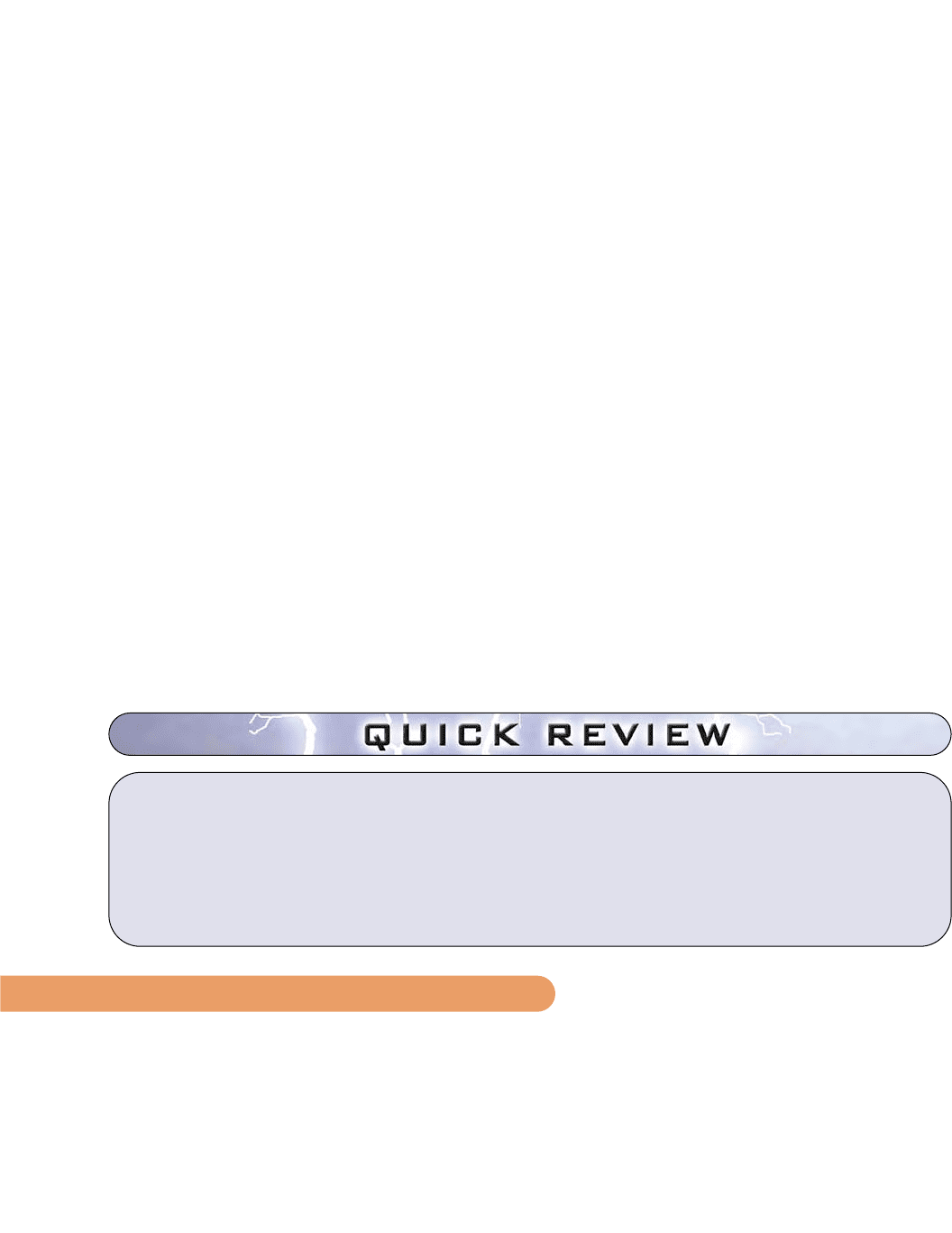
from total annual benefits (column 4). Net benefits are positive for plans A, B, and
C. Plan D is not economically justifiable because net benefits are negative.
But the question of optimal size or scope for this project remains. Comparing the
additional, or marginal, cost and the additional, or marginal, benefit relating to each
plan determines the answer. The guideline is well known to you from previous dis-
cussions: increase an activity, project, or output as long as the marginal benefit (col-
umn 5) exceeds the marginal cost (column 3). Stop the activity at, or as close as
possible to, the point at which the marginal benefit equals the marginal cost. Do not
undertake a project for which marginal cost exceeds marginal benefit.
In this case plan C (building new four-lane highways) is the best plan. Plans A
and B are too modest; the marginal benefits exceeds the marginal costs. Plan D’s
marginal cost ($10 billion) exceeds the marginal benefit ($3 billion) and therefore
cannot be justified; it overallocates resources to the project. Plan C is closest to the
theoretical optimum because its marginal benefit ($10 billion) still exceeds marginal
cost ($8 billion) but approaches the MB = MC (or MC = MB) ideal.
This marginal cost = marginal benefit rule actually tells us which plan provides
the maximum excess of total benefits over total costs, or in other words, the plan that
provides society with the maximum net benefit. You can confirm directly in column
6 that the maximum net benefit (of $5 billion) is associated with plan C.
Cost–benefit analysis shatters the myth that “economy in government” and
“reduced government spending” are synonymous. “Economy” is concerned with
using scarce resources efficiently. If the cost of a proposed government program
exceeds its benefits, then the proposed public program should not be undertaken,
but if the benefits exceed the cost, then it would be uneconomical or “wasteful” not
to spend on that government program. Economy in government does not mean
minimization of public spending; it means allocating resources between the private
and public sectors to achieve maximum net benefit. (Key Question 3)
In performing its allocation function, government not only produces public goods
but also corrects for kinds of market failure called externalities or spillovers. Recall
from Chapter 4 that a spillover is a cost or a benefit accruing to an individual or
group—a third party—that is external to a market transaction. An example of a
spillover cost or a negative externality is the cost of breathing polluted air; an exam-
ple of a spillover benefit or a positive externality is the benefit of having everyone
else inoculated against some disease. When there are spillover costs, an overpro-
duction of the related product occurs as does an overallocation of resources to this
product. Conversely, underproduction and underallocation of resources result
when spillover benefits are present. We can demonstrate both graphically.
chapter eighteen • government and market failure 461
mc = mb
rule
For a
government project,
marginal benefit
should equal mar-
ginal cost to pro-
duce maximum
benefit to society.
● The demand (marginal–benefit) curve for a pub-
lic good is found by vertically adding the prices
all the members of society are willing to pay for
the last unit of output at various output levels.
● The socially optimal amount of a public good is
the amount at which the marginal cost and mar-
ginal benefit of the good are equal.
● Cost–benefit analysis is the method of evaluat-
ing alternative projects or sizes of projects by
comparing the marginal cost and marginal ben-
efits and applying the MC = MB rule.
Externalities Revisited
externali-
ties
Benefits or
costs from produc-
tion or consumption
accruing without
compensation to
nonbuyers and
nonsellers of the
product.
